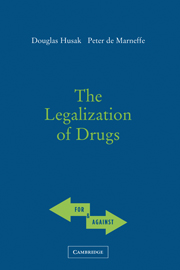8 - Alcohol and Other Drugs
Published online by Cambridge University Press: 05 June 2012
Summary
Alcohol Prohibition
I have now explained how it is perfectly coherent to defend heroin prohibition without also defending all sorts of other paternalistic policies such as the prohibition of fast-food burgers. Some may still wonder, though, whether it is possible coherently to defend heroin prohibition without also defending alcohol prohibition. Are not the independent harms of heavy drinking at least as great as the independent harms of heroin abuse? Might not these harms also be reduced substantially by a policy of prohibition? If so, does not alcohol prohibition satisfy the individualistic principle of sufficient reason at least as well as heroin prohibition does? If so, is not this an objection of sorts to the individualistic principle of reason as a test of whether a government policy violates our moral rights, since national Prohibition was such an obvious failure?
National Prohibition did fail politically, but most scholars seem to agree that it succeeded in reducing per capita alcohol consumption, and heavy drinking in particular. An important piece of evidence is that the liver cirrhosis morality rate declined by nearly 50 percent during Prohibition, and admissions to state mental hospitals for alcoholic psychosis declined substantially as well. It is reasonable to believe, moreover, that if Prohibition had been effectively enforced and had retained solid political and cultural support over time, heavy drinking would have remained relatively low, with less damage to individuals as a result.
- Type
- Chapter
- Information
- The Legalization of Drugs , pp. 171 - 189Publisher: Cambridge University PressPrint publication year: 2005



